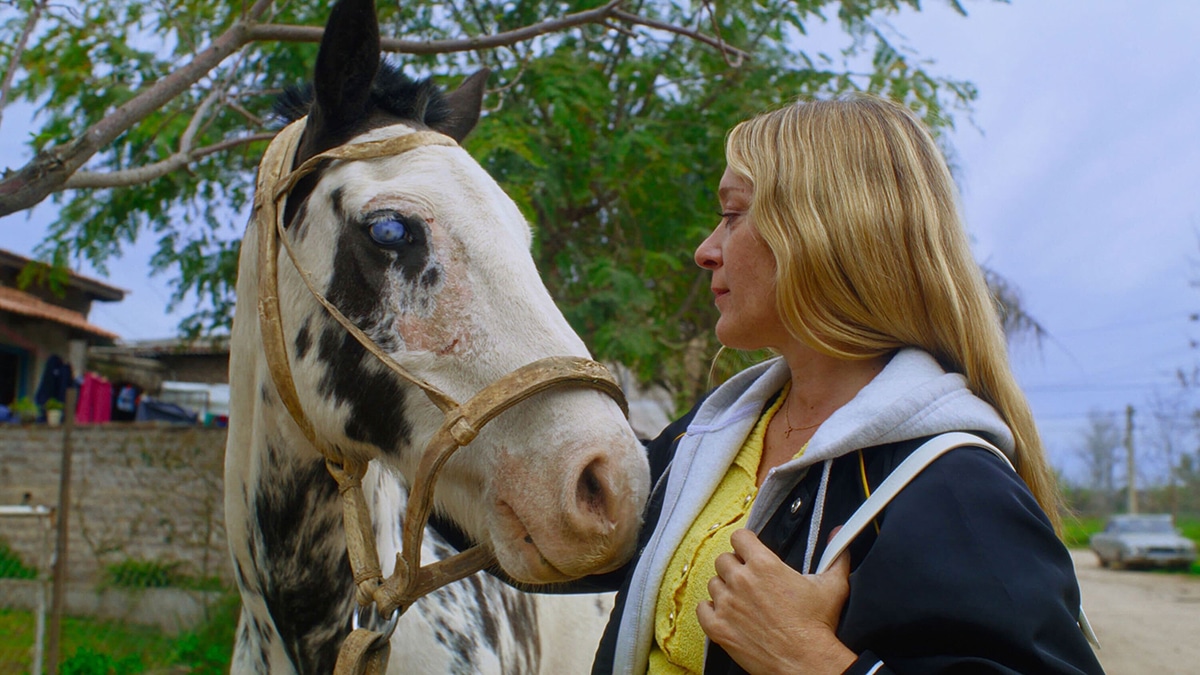“My grandma’s was sort of the root of this story,” Writer/director Amalia Ulman tells Latina Media Co about her new film, Magic Farm. It premiered at Sundance this year and is showing at Berlinale, the Berlin International Film Festival this week. “She was raised, because she’s a brown Argentinian, to be very submissive… to lower your head and you say ‘yes’ to everything,” she explains, “Many times I’ve asked my grandma something, and out of politeness, she has said yes, even though she hasn’t really understood the question.”
As played by Ulman’s grandmother, the fictional Marita likewise causes the misunderstanding that sets Magic Farm in motion. She talks on the phone with Jeff (Alex Wolff) who works in “hipster media,” as Ulman puts it. Based on their conversations, he brings an entire film crew to her village, including Chloë Sevigny as pampered boss Edna, her skeezy husband Dave (Simon Rex), warmhearted cameraman Justin (a charming Joe Apollonio), and Ulman herself as the bilingual producer Elena. They’re there to film a docuseries on quirky, local trends, but soon find out they’re in the wrong country altogether.
The ensuing comedy is pretty gentle to all sides, even as it becomes apparent that the entire town is being poisoned by glyphosates, a chemical sprayed on crops, and the film crew has no interest in covering that story – they’d rather make up a fake a trend and be on their way.
“The film is about how, yes, the Americans are bad and taking advantage, but also the locals are really not giving full disclosure of the dangers of being there, because they are trying to [get] a piece of pie,” Ulman explains. “The pattern applies to any documentary done about a superficial trend from a third-world country. There’s always something else going on, but obviously you have to choose what to cover.”
As someone who’s been on both sides of it (“I’ve been the Latino and I’ve been the gringo, depending on where I go”), Ulman thinks it’s “totally valid to just cover” the silly story at times. She may have a lot of empathy for her bumbling film crew, but she also calls them “jaded,” adding that they’re part of “an industry in decline, and they know it.”
Of her character, the writer/director says, “I’m not that close at all. It’s based on a lot of people that I’ve met.” Elena is “not in a position of power,” stuck “running the errands for Nepo babies.” So it makes sense that she and her colleagues are more worried about their personal dramas and lack of health care than the injustice before them. Still, Magic Farm gently chastises the crew for their callousness, making sure they get a dose of poison before they go and lampooning many of their half-hearted efforts to connect.
The locals – Marita, a bored village girl Manchi (a scene-stealing Camila del Campo) who becomes one of Jeff’s love interests, her gossipy mother Popa (Valeria Lois), and the down-to-earth innkeeper (a charming Guillermo Jacubowicz) – are all as vibrant as the film crew that visits them. And they’re not powerless, as Ulman notes. They’re working their side of the equation too.
It’s a vision of agency for Argentians, the type we rarely see in (mostly) English-language films. Ulman underlines her ability to understand, depict, and give breathing room to her birth country with a host of animal imagery. “That’s just how Argentina feels like to me,” she shares. “The national identity is the gaucho, and there are horses parked everywhere.” We don’t see anyone reminiscent of a cowboy, but we do see Edna making friends with a horse, shots from the local dogs’ perspectives, and generally just animals everywhere. Ulman says, “I wanted to be open to show the sort of Argentina that I felt whenever I went to visit when I was a kid.”
The other thing she wanted to capture was her grandmother who performs an original song in the film. “She wrote that song, and she writes poetry,” Ulman says with pride, even as she qualifies it by adding, “Obviously, her and I don’t share the same views in a lot of things.” Most of Ulman’s family is Catholic, she clarifies, but her grandmother needed to take it a step further, joining the Evangelical church. “She has this relationship with God – she talks to him and gets messages from him, and he makes her do things – that [is], from the outside, maybe crazy,” Ulman half-jokes.
But as a granddaughter, the filmmaker has enough distance to find her elder’s intensity fascinating – and also see the challenges her grandmother faced. “Argentina is very racist, and so she’s not the darkest of the sisters, but, she’s Indigenous looking,” Ulman explains. “If you look Indigenous, you won’t be given opportunities. And that’s like a reality that I’ve seen all my life.” As a result, “She’s never been given the opportunity to be an artist or anything, but she’s a very creative person. So she just used the outlets that were allowed to her” – here the church.
Thankfully, Ulman is in a different position, a filmmaker with two features and four shorts under her belt. With Magic Farm, she’s gently peeling back the power dynamics between exploited US media workers and their subjects in the global south. Under Ulman’s discerning eyes, the film gives equal understanding to both sides, satirizing not so much her characters but the systems that have tossed them together in this particular, superficial structure.

